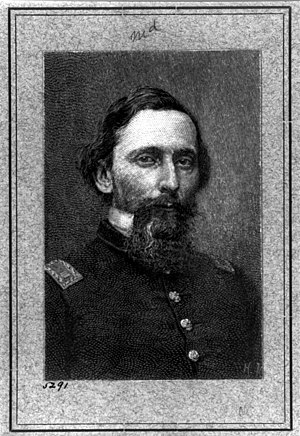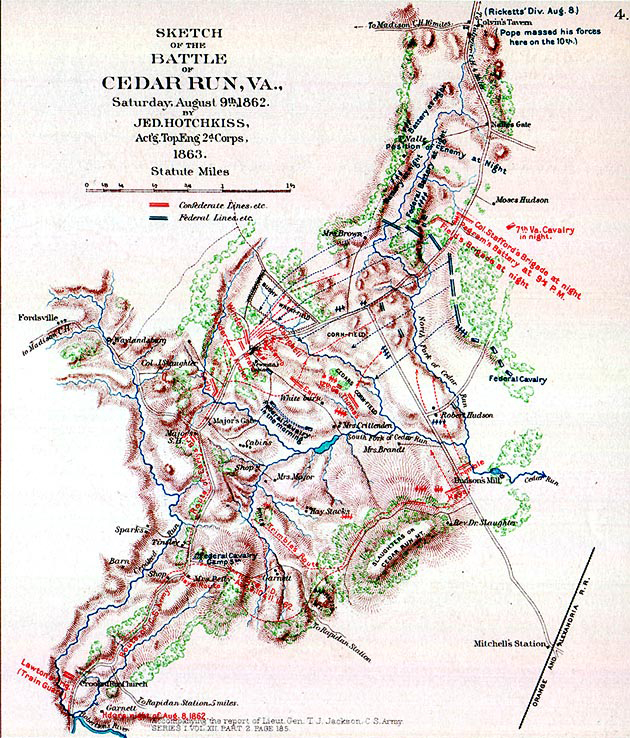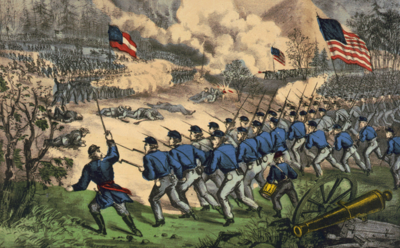Stonewall Jackson began his advance towards John Pope's Army of Virginia in the first days of August. On the 9th he encountered Federal troops around Cedar Mountain, also called Slaughter Mountain. They were under Nathaniel Banks, the old opponent from the Valley Campaign who the rebels called Commissary Banks because of the large amount of supplies they had captured from him. "Get your requisitions ready, boys!" soldiers said as the news went through the army, "Put down everything you want! Old Stonewall's Quartermaster has come with a full supply for issue."
 |
| General Winder |
Jackson formed his line along a road running north-south. Ewell on the right was anchored on Cedar Mountain, a commanding artillery position. The left was positioned at a road intersection. The battle opened at 4 pm with an artillery duel. It continued for 1 1/2 hours with 23 Southern cannon in action and a few more for the North. The Confederates, with a converging fire from the mountain, got the better of the engagement. The Federal artillery produced more noise than execution, but one ball found an important mark. Edward Moore, a Confederate artillery soldier, wrote,
"General Winder, commander of our brigade, dismounted, and, in his shirt-sleeves, had taken his stand a few paces to the left of my gun and with his field-glasses was intently observing the progress of the battle. ... While the enemy's guns were changing their position he gave some directions, which we could not hear for the surrounding noise. I, being nearest, turned and, walking toward him, asked what he had said. As he put his hand to his mouth to repeat the remark, a shell passed through his side and arm, tearing them fearfully. He fell straight back at full length, and lay quivering on the ground. ... He was soon carried off, ... and died a few hours later."Winder was commanding the Stonewall Division, and the command went to William Taliaferro, who because of Jackson's secrecy had no idea of the battle plan. At 5:45 Augur's division advanced against the Confederate center and left. Moving through the high corn, they achieved some surprise although their formations were disorganized. The Confederates kept up a steady fire for about 20 minutes. They were finally reinforced by troops from A. P. Hill whose division was coming up. A soldier remembered the trying advance:
"The field we passed through was an extensive one, and presented to our sight, as we we entered it, almost innumerable bodies of troops fighting, with nothing to protect them save the hand of God. Friend and foe were in open field, and such fighting is seldom witnessed. Troops of all descriptions – horses in every direction, with empty saddles – wounded and dead in all quarters."The Confederate center and right held firm, but the left, held by Garnett's brigade, did not. Reinforcements were slowly moving up, and they were only 10 minutes away. But at 6 pm Garnett's men were overwhelmed by a sudden charged. Coming across the Wheat field the Yankees rushed towards the Gate, the intersection of the two lanes. Garnett's troops stood firm along a fence, firing volley after volley, but the Federals would not stop. Leaping the fence they fought hand to hand, with bayonets and rifle butts, and soon drove Garnett's men into a rout. The Federals continued to push forward and struck a green Confederate brigade in the flank, routing it as well, and sending the entire Confederate center into retreat. Almost the entire Confederate line had been broken by one small Union brigade. But A. P. Hill's men were coming up and several brigades were available to throw into the fight. Jackson himself was at the point of danger trying to rally his men. He tried to draw his sword, the only time he did this during the war, but from disuse it was rusted in the scabbard. So he held up the sword and scabbard in one had and a battle flag in the other. "Rally, brave men, and press forward." Jackson shouted, "Your general will lead you. Jackson will lead you. Follow me!"
 |
| The Whitefield looking toward Cedar Mountain |
Jackson was able to rally the men, and soon the Federal troops were being driven back. Struck by Branch's brigade on the front and the Stonewall Brigade on the flank, they were driven back through the wheat field. By about 7:00 the Confederates were counterattacking, charging Gordon's brigade on the front ad coming on the flank. By dark Jackson had finally won the day. He had come close to being defeated and even personally captured, but his men finally fell into place and drove back the Federals. He was unable to pursue because of the darkness. The North lost 314 killed, 1445 wounded and 594 captured, the Confederates 231 killed and 1,107. At Cedar Mountain Jackson had only defeated Pope's vanguard. The rest of the army remained undefeated, and still outnumbered the Confederate forces. More battles would be necessary for Lee to obtain a complete victory over Pope.





0 comments:
Post a Comment